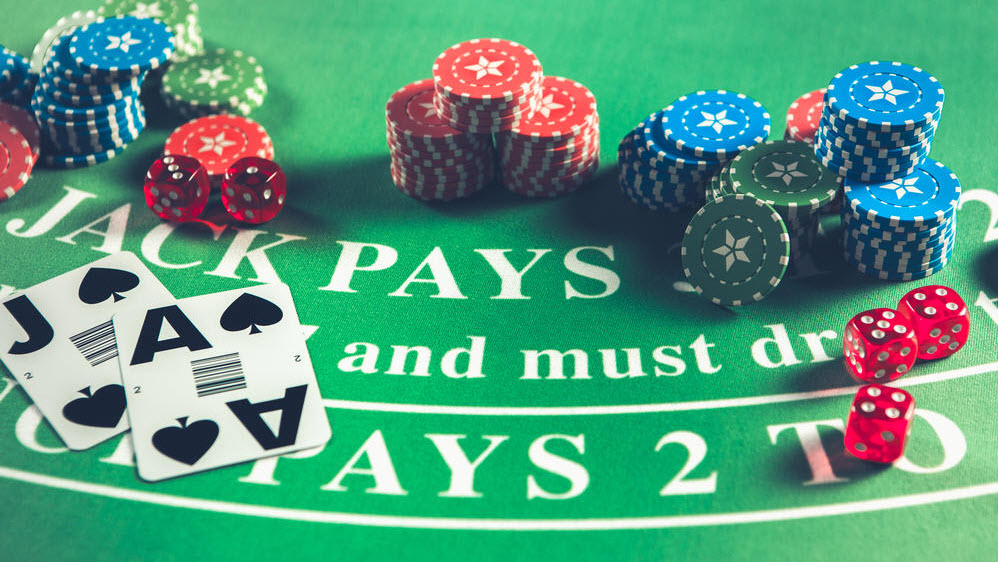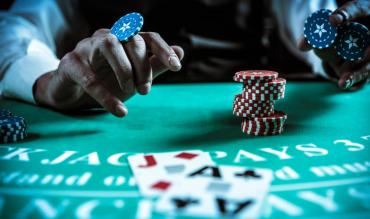Blackjack is a game of numbers.
Regardless of whether you play live or online casinos, you have numbers for card values: 1 or 11 for an Ace, 10 for 10s and face cards, and face values such as 2 for 2s, 3 for 3s and so on for the rest.
Those lead to hand totals. A 9, a 3 and a 5 total 17. A Queen and a Jack total 20.
Twenty-one is an important number. If your total exceeds 21, you lose. If it's 21 or less, you win if your total is higher than the dealer's.
Another important number is 17. Dealers must hit a total of less than 17 and must stand on any total greater than 17. Seventeen itself is murky territory. Dealers always must stand on hard 17, but some casinos require dealers to hit soft 17.
Those restrictions on the dealer make possible basic strategy and its own number set. Your total and the number associated with the dealer's face-up card have been charted out to tell you whether hitting, standing, doubling down and splitting pairs gives you the best chance to profit.
Beneath the surface is another set of numbers that tells us more about the most popular table game.
34, or sometimes 55
Assuming card order and composition don't matter, there are 34 possible two-card starting hands for blackjack players.
That card order doesn't matter for players is a given. Regardless of whether your first two cards come with a 9 first and a 3 second, you have the same 12, and you see both cards before you can make a play.
If you consider all hard hands with the same two-card total as one possible hand, there are 34 starting hands. That counts hard 12 as one hand even though it can be made as 10-2, 9-3, 8-4 or 7-5. Two 6s are counted separately among pair hands rather than hard hands.
Similarly, the 34 total includes all pairs of 10 values as one hand, instead of separating out King-King vs. King-10, Queen-Jack or any other pair totaling 20.
That leaves 15 hard hands from 5 through 19; eight soft hands from Ace-2 through Ace-9; 10 pairs from Ace-Ace through 10 value-10 value, plus blackjack.
If you want to consider the different ways to make hard hands and the different ways to make pairs of 10s as separate hands, the number of starting hands climbs to 55.
To most players, the composition of a two-card total makes no difference. Some advanced players augment basic blackjack strategy by composition-dependent strategies.
For example, in a two-deck game where the dealer has a 4 face up, basic strategy indicates you should stand. However, those who take advantage of composition-dependent strategies stand on 9-3, 8-4 or 7-5 but hit on 10-2. The presence of the 10 in your hand makes it slightly less likely you'll bust.
That's enough in a close-call hand to shift strategies. It can be a bit much for a recreational player to track, but there is reason for advanced players to look at more than the basic 34 starting hands.
21 and 441
On average, your first two cards will include an Ace and a 10 value to make blackjack once per 21 hands.
The odds are exactly the same for the dealer. That means player and dealer will have blackjacks on the same and once per 21 times 21 hands, or once per 441.
Most of the time, your blackjack is going to win and get a premium payoff, but once per 441 hands you'll be dealt a blackjack that's pushed by a dealer blackjack.

1.4 percent
That premium payoff on blackjack mentioned above is 3-2 at most tables. That's the way it's been for more than a century. But some tables pay only 6-5 on blackjacks.
Some recreational players don't really understand the implications. If you bet $10, a 3-2 payoff on blackjack brings you $15 in winnings. If the payoff is only 6-5, your winnings are reduced to $12.
That happens often enough that this simple change increases the house edge by 1.4%. Given the entire edge against a basic strategy player in most blackjack games is less than 1%, a 1.4 increase is enormous. That rule alone suggests you should find a different casino with more player-friendly conditions.
52 vs. 312
If other rules are equal, why does a single-deck game have a lower house edge than a game with more decks?
It's because each card already dealt has a greater effect on the remaining deck when fewer cards are in play. That leads to a greater percentage of blackjacks with fewer decks. Since players are paid a premium on blackjacks and the house is not, more blackjacks favors players and reduces the house edge.
We can see that by comparing a single-deck game, with 52 cards, to a six-deck game, which uses 312 cards.
In a single-deck game, there are four Aces and 16 10-value cards, with four 10s, four Jacks, four Queens and four Kings. With six decks, multiply everything by six and you can see there are 24 Aces and 96 10 values.
Imagine your first card is an Ace in a single-deck game. There are 51 other cards and 16 of them are 10 values. Your second card will complete a blackjack 31.4% of the time.
In a six-deck game, after you're dealt an Ace there are 311 other cards and 96 are 10 values. That's 30.9%, so you get your blackjack less often with more decks.
The effect is smaller when you start with a 10 because there are fewer Aces, but it points in the same direction. After a 10 in a single-deck game, four of 51 cards, or 7.8%, are Aces. When you start with a 10 with six decks, 24 of 311 cards are Aces, and that's a shade less at 7.7%.
The same kind of effect applies on double-down hands. If you start with 6-5 with one deck, 32%of the remaining cards are 10 values that will give you 21. In a six-deck game, only 31% are 10 values.
Together, the blackjack and double-down percentages make more decks tougher on players if all other rules are equal.
The percentages change as more cards are dealt and, by the way, that's why card counting works. When there's a greater concentration of high cards remaining, there are more blackjacks and counters increase their bets. A greater concentration of low cards signals fewer blackjacks, so counters reduce their bets or leave the table.

1 in 3 vs. 1 in 3.2
A standard bet offered at nearly every blackjack table is insurance. It's a bet the dealer has blackjack.
When the dealer's face up card is an Ace, you may make an insurance bet of half your original blackjack bet, so if you bet $10 on the hand, your insurance bet would be $5.
If the dealer's face down card is a 10 value to complete a blackjack, you lose your original bet but are paid at 2-1 odds on insurance. You might lose a $10 blackjack bet, but you win $10 on insurance, so you break even on the hand.
But if the dealer doesn't have blackjack, you win $10 on your original bet and lose $5 on insurance, for a $5 net profit.
When you have a blackjack and the dealer shows an Ace, you can take insurance by calling "even money." If you bet $10, you're paid $10. You give up the chance at the 3-2 premium payoff in exchange for winning even if the dealer has blackjack,
It's all shorthand, skipping the step of putting an insurance bet on the table. Played out with a $10 main bet and $5 in insurance, if the dealer has blackjack you push on your main bet and are paid at 2-1 odds for a $10 profit on your insurance. If the dealer doesn't have blackjack, you win $15 with a 3-2 payoff on your main hand, but lose $5 in insurance, leaving a $10 profit overall.
Either way, your profit is $10, equal to your original bet. So the house just simplifies matters and lets you call "even money."
All that would be a break even deal if the dealer had a 10 value card face down one-third of the time he had an Ace up. But the dealer blackjack chance isn't 1 in 3. It's rounded to 1 in 3.2 – 1 in 3.19 in one-deck games, 1 in 3.24 with six decks.
The discrepancy means the house has an edge on insurance. Smart players skip insurance and just take the wins, losses and pushes as they come. Exception: card counters who know the composition of the remaining deck includes better than 1 in 3 cards are 10 values have an edge on insurance.
Card counters know better than anyone that blackjack is a game of numbers.


